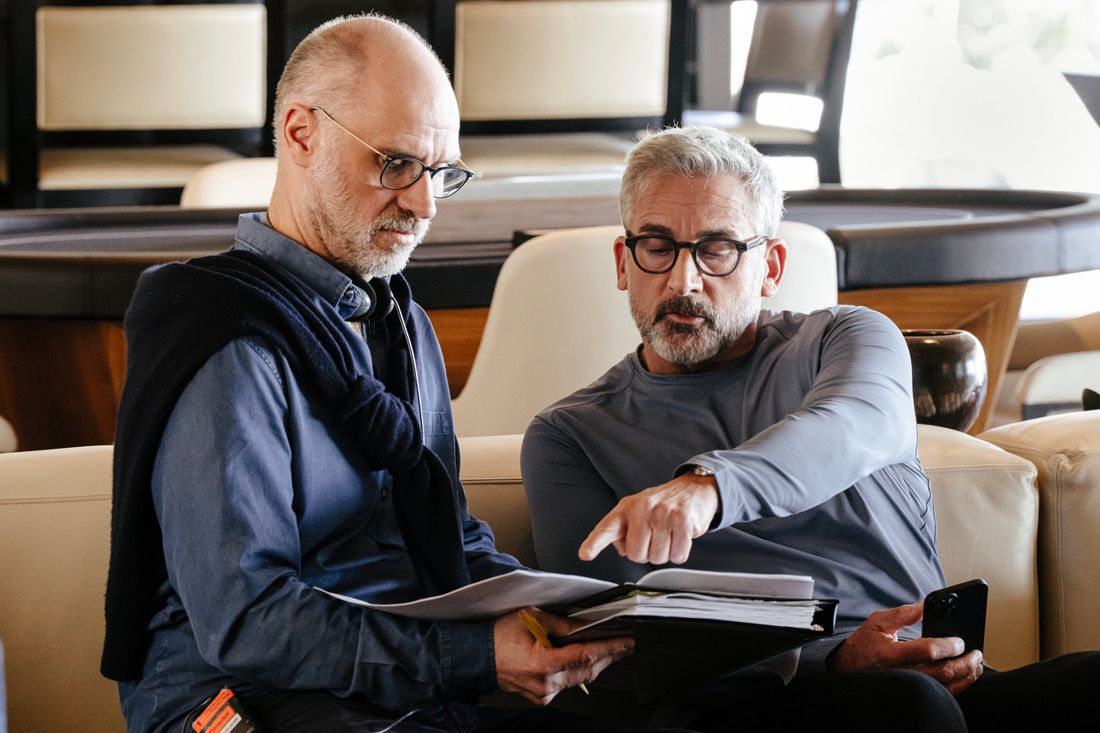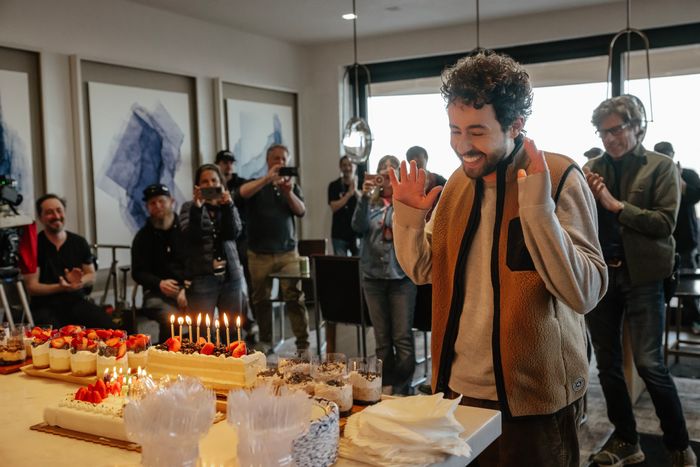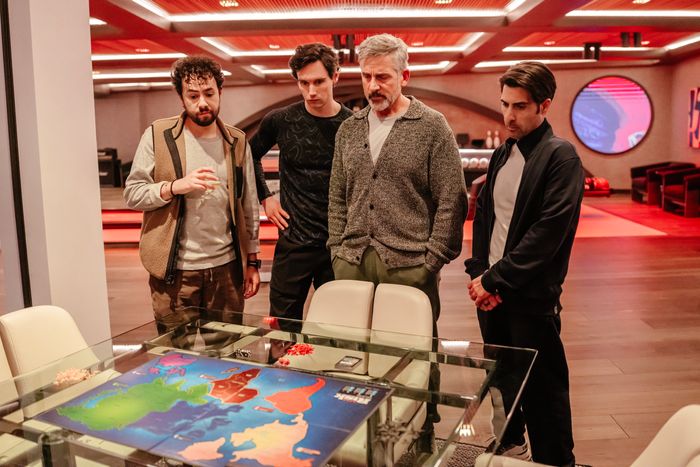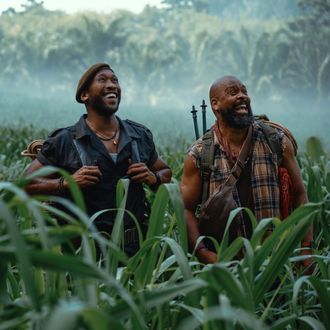

Jesse Armstrong and Steve Carell on set earlier this year.
Photo: Macall Polay/HBO
I’m in a seven-story mansion in the Wasatch Mountains of Utah that looks like a ski lodge commissioned by Tony Stark. It’s late March, and actors Steve Carell, Cory Michael Smith (Saturday Night), Ramy Youssef, and Jason Schwartzman are shooting an outrageous scene for Mountainhead, Succession creator Jesse Armstrong’s directorial debut about four arrogant tech moguls who get together for a boys’ weekend that goes fantastically awry.
The context: Youssef’s character, Jeff, owns a company that has just devised a filter that can identify and block hyperrealistic generative-AI images. Smith’s character, Venis — rhymes with tennis, not the appendage — is the founder and current owner of Traam, a Facebook-esque social-media platform. He desperately wants Jeff’s tech because Traam is being overrun by politically and theologically inflammatory false images that have triggered violent outbreaks around the world. Carell plays Randall, a.k.a. Dark-Money Gandalf, a venture capitalist and father figure to the others (Jeff even calls him Papa Bear). Jeff, Venis, and Randall are all worth billions. The fourth guy, Schwartzman’s Hugo Van Yalk, is the only one in the group who isn’t a billionaire. The others have nicknamed him Souper, short for Soup Kitchen.
In the scene they’re currently filming, Jeff catches Hugo in a lie about knowing somebody at the International Monetary Fund. Jeff gets him to agree that if he can prove Hugo is lying, he’ll have permission to perch atop Hugo’s chair like a jungle cat on a tree branch and “fuck your head.” Hugo admits to lying, and Youssef climbs onto the chair and begins dry-humping the back of Schwartzman’s skull.
Between takes, Armstrong and the actors discuss how best to calibrate the hip movements and Youssef’s pornographic vocalizations, tweaking the blocking to get the best view of everyone’s faces no matter what perspective the camera assumes. After calling “action,” Armstrong watches the monitor, his look morphing from wondrous delight to a coolly detached scrutiny. Armstrong’s crew struggles not to crack up. “This is fuckin’ gold!” a crew member whisper-giggles.
Gold or not, that scene doesn’t actually end up in the movie. “I’ve had to cut a bunch,” Armstrong tells me a few weeks later, when the edit is complete and the actors are in a London recording studio dubbing new lines. “I’m keen for it not to be too long!”
He doesn’t want to take too long, either. Mountainhead’s rushed schedule is by design. Armstrong worried that the film might seem irrelevant if he took his sweet time with it. He came up with the basic story in November 2024, pitched it to HBO executive Casey Bloys in December, assembled the cast and crew in January and February while simultaneously writing the screenplay, and shot it over five weeks this spring for a May 31 debut. He says he was intrigued by the challenge of “kind of running headlong into something that felt like it was culturally still happening.” Succession, he tells me, was “partly about an older guy looking at his mortality,” but it was also about the idea of one cultural power center dying out as another one supplanted it. “The real power is now in social media and tech, and so it felt interesting to do something very current.”
The seed for the film was planted in the fall of 2023, when the Times of London asked Armstrong to review Michael Lewis’s book Going Infinite, about convicted fraudster and crypto pusher Sam Bankman-Fried. The assignment spurred Armstrong to “read more tech stuff than I had done for a while.” He became so engrossed in the research that he started listening to podcasts about technology and the deals surrounding it. In the process, Armstrong began noticing that most of the power brokers in tech had a very specific “tone of voice that I couldn’t get out of my head” — one marked by “a straight-up arrogance, which is both scary and comic. You know, being unaware is a key reason why people are funny, and arrogance is a good way of being unaware. And then there’s a whole intellectual framework, which, broadly speaking, the Silicon Valley tech world brings.” He describes it as a “first-principles approach,” one that begins “by asking, ‘What are we trying to achieve here, and how do we get there in the cleanest, most financially and humanly efficient way?’ There’s something very appealing about that. But it also has a comic side, which is like, Do I need my mum and dad? Do I need my kids? Do I need to keep on feeding my kids? What will happen if I zero this out? Oh — my kid died? Shit! We need to buy more food for the kids! Otherwise they won’t be alive!”
The film feels as if it could be unfolding in an unexplored corner of the Succession universe. And like Armstrong’s acclaimed series, it blends erudition, wit, cruelty, and perversity, sometimes in the same scene. Prior to this, Armstrong says, he felt no impetus to keep pace with 21st-century life. Succession was loosely inspired by real events and people (in particular the Murdoch family), and it sometimes seemed to coincidentally mirror the news, especially during the final season, when the children of media boss Logan Roy got in bed with a fascist American presidential candidate, but it was never riffing off specific things that were happening as the scripts were being written. The scope and expense of the production made that impossible. Besides, it wasn’t in the mission statement to reflect or critique real events, nor was it dramatically advisable. Aaron Sorkin’s The Newsroom became the most ridiculed series on HBO by trying to do that.
Mountainhead isn’t Newsroom-ing it. It’s creating characters who are sort of like people you know, but not exactly. Certain elements are combined and rearranged: Randall seems like a bit of Steve Jobs and a bit of Bill Gates and maybe a bit of Warren Buffett, but he’s his own person. So are Venis and Jeff, who are much cooler and more naturally bro-y than Mark Zuckerberg could ever be, no matter how much bling he buys. But it does have the frisson of immediacy. How could it not, having been cranked out so quickly? “It feels like he called me on a Tuesday, we shot it on a Thursday, and then it’s coming out, like, the next Friday!” Carell tells me. “It’s the most compact production process I’ve ever experienced.”
Ramy Youssef celebrates his birthday on set.
Photo: Macall Polay/HBO
Although Armstrong hasn’t had an official big-league directing credit until now, the 54-year-old has spent so many hours writing, producing, or supervising the editing of various TV programs (including Armando Iannucci’s political satire The Thick of It, on which he was a writer-producer, and the sitcoms Fresh Meat and Peep Show, in collaboration with his friend Sam Bain) that this leap would seem a mere formality. Youssef — who landed on Armstrong’s radar because of his Hulu series, Ramy, in which Succession actor Hiam Abbass plays Youssef’s mother — felt pretty certain that Armstrong wasn’t the sort of guy who’d break a sweat over directing a small movie. At least not after Succession, anyway. “It was so exciting to just see Jesse work like, ‘Yeah, fuck it, I could do a movie — I mean, I usually do ten of these a season,’ ” he says.
Armstrong disagrees, telling me his esteem for “actual directors” like his friend Mark Mylod, a co–executive producer of Succession, is so great that to act as if he fully understood film direction before stepping onto the set “would have been disrespectful to the craft.” Has he always been this reverent when contemplating the job? Armstrong is a film buff, so yeah, probably. But in talking to him, it seems just as likely that his zoological study of Billionaireus doucheus made him extra cautious of falling into the same thought traps as the species he’s portraying. Chief among them: Acting as if your achievements in one field make you an expert in all things. “I don’t want to pretend that the people in Silicon Valley don’t know things I don’t know and aren’t able to do things I’m not able to do,” he tells me. “But with that comes arrogance. It happens if you’re a railroad person in 1880, and it happens if you’re a general in 1945, and it happens if you’re a tech guy right now. It just seems like you’re right at the center of the culture, and everything is about you, and you’ve got all the answers.”
Armstrong is so outwardly self-deprecating that at first he comes off as insecure or perhaps reflexively deferential. But to watch him direct is to realize that, no matter how forcefully he downplays his skills, he’s a duck in water. He has clear ideas of what he wants from a scene and an easygoing, conflict-averse way of getting it. He might, for instance, make a suggestion to cinematographer Marcel Zyskind or executive producer Jill Footlick, then conclude it with something like, “But of course, if that’s completely absurd and unfeasible, we don’t have to.” Or he’ll ask if it’s theoretically possible to make some incredibly basic adjustment, like bringing down the heat on a line reading or repositioning a camera, then add, “D’ya think?”
Armstrong is also, for a university-schooled Englishman who references Plato, Marcus Aurelius, and Immanuel Kant in dialogue, keen to guard against seeming pretentious. “He’s an incredibly smart guy, but he doesn’t wear it on his sleeve,” Carell says. “I guess what I did not expect is that he’s quite, quite goofy and quite silly, really.” I experienced this during a break between scenes when I told Armstrong that the setup of Mountainhead reminded me of the 1962 Luis Buñuel satire, The Exterminating Angel, wherein a rich couple’s servants abandon them on the day of a dinner party, and the guests, who don’t actually know how to do anything, are paralyzed with indecision and functionally trapped there. Armstrong kicked the comparison around with me for a couple of minutes, but when Zyskind beckoned him away to discuss the next camera setup, he jabbed a thumb over his shoulder at me and stage-whispered, “He thinks I know who Luis Buñuel is! Help me out here!”
Armstrong’s default expression on set is an enchanted grin when he’s watching actors play his scenes — which, as on Succession, are always shot linearly from beginning to end with two cameras, rather than in fragmented, nonchronological setups, the better to generate momentum and keep the performers focused. Schwartzman says he had wanted to work this way since he began watching Succession. He describes the series as catnip to a “dorky” side of him that treats acting as a rarefied athletic event in which high-level technique is its own source of excitement. “It seemed to me, and I could be wrong, that as the show went on, the scenes became not longer, exactly, but felt as if they were longer; as if you were watching actors in longer, more complete takes, doing these immense and powerful scenes,” he says, “and it was really just inspiring to watch.”
As on Succession, Armstrong inserted alternate lines into script pages (clearly marked as ALTS) so that the actors could surprise their scene partners and kept takes running long after their official end point, letting the performers marinate in uncomfortable silence until one of them said something to break the tension. Calling “cut” immediately seems “rude” to Armstrong “because you never quite know if they might say something; you don’t want to cut them off. So I like being polite, and they often give you things.”
Mountainhead.
Photo: Macall Polay/HBO
Despite the tight schedule, which made it impossible to do more than a few takes of each scene, the atmosphere on Mountainhead was relaxed. Everyone seemed willing to accept suggestions from colleagues, even ones with different areas of expertise, as when production designer Stephen Carter, one of many Succession department heads imported to Utah, came up with the idea of Schwartzman’s character having expensive band equipment, then ran with a suggestion from Schwartzman that the instruments should look as if they’d never been touched.
Armstrong tells me that he briefly toyed with the notion of establishing Mountainhead as occurring within the Succession universe by having the moguls watch a news report on ATN, Logan Roy’s channel. He nixed it because it seemed too cute and because he wanted the movie to have a distinct identity. And it does. There’s no shortage of knuckle-head comedy bits, including Randall walking face-first into a glass door and the guys gathering atop a snowy cliff, opening their ski vests and shirts, and writing their net worths on their bare chests with a red Sharpie. But there’s an overriding sense of moral emptiness and a whiff of sulfur. Where the Succession siblings wanted to be seen as good and sometimes pretended to have principles, the Mountainhead quartet is all about greed, nihilism, and delusions of godhood: They want to rule as much of the world as they can and watch the rest burn. Youssef says that another difference between the billionaire tech bros of Mountainhead and the Royco players is that “there’s a level of nepotism on Succession that I think doesn’t quite exist with these characters, at least the way that I saw it. The Roy children are very much bred into a certain pedigree. What’s so different about these guys is that, as far as I interpreted it, they did come into wealth on their own. I think these guys viewed themselves as nerdy underdogs. That view, which made them so successful coming up, has not been adjusted for the reality of what power they wield.”






